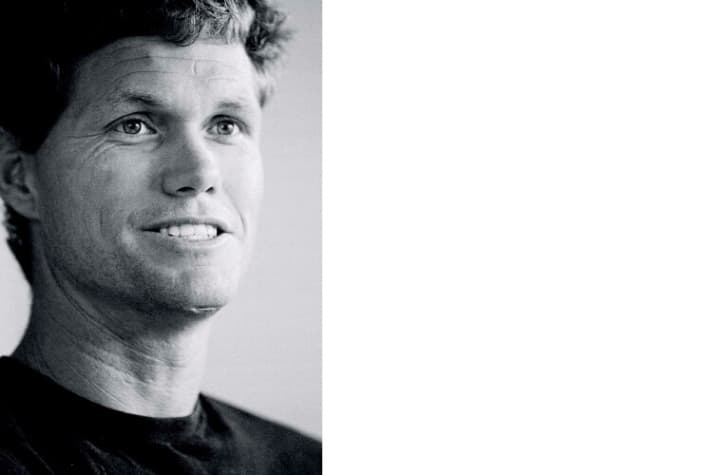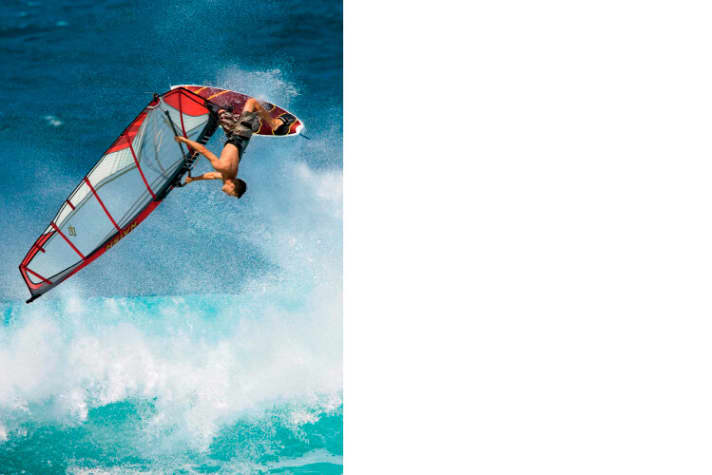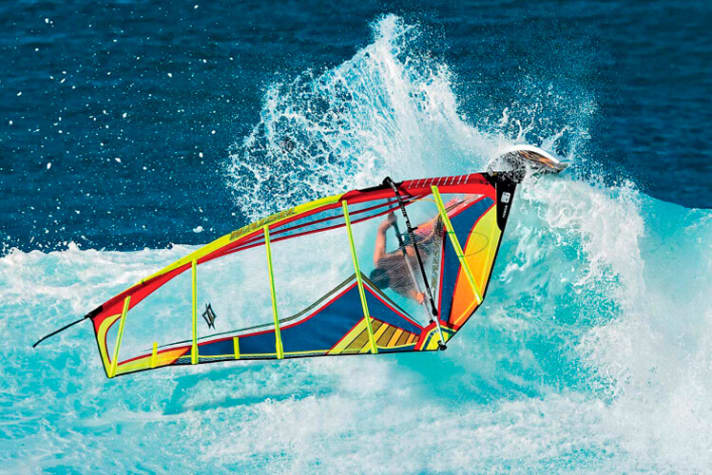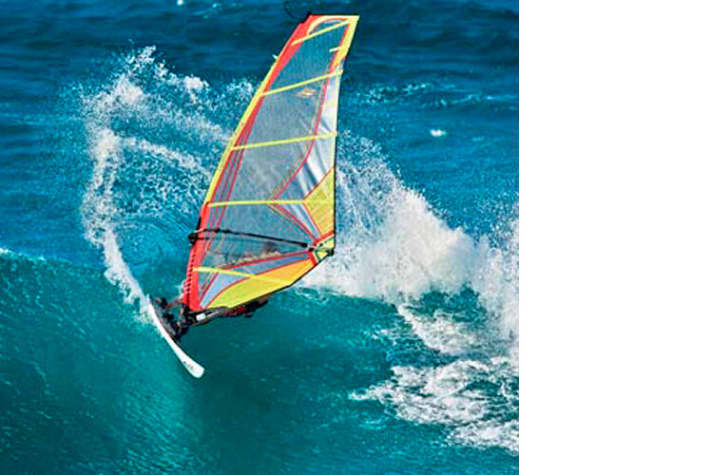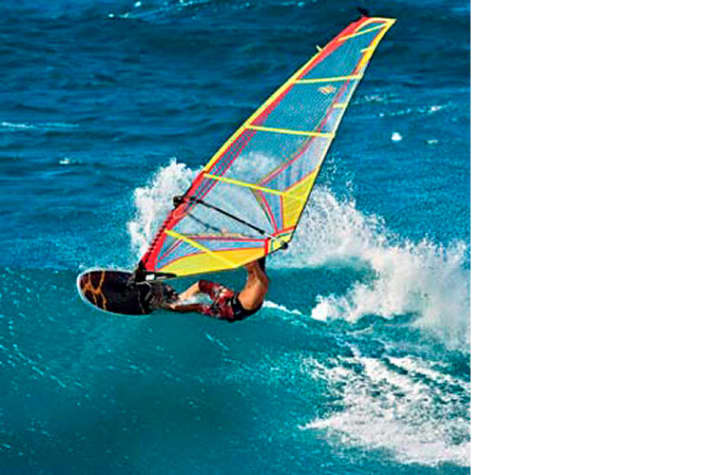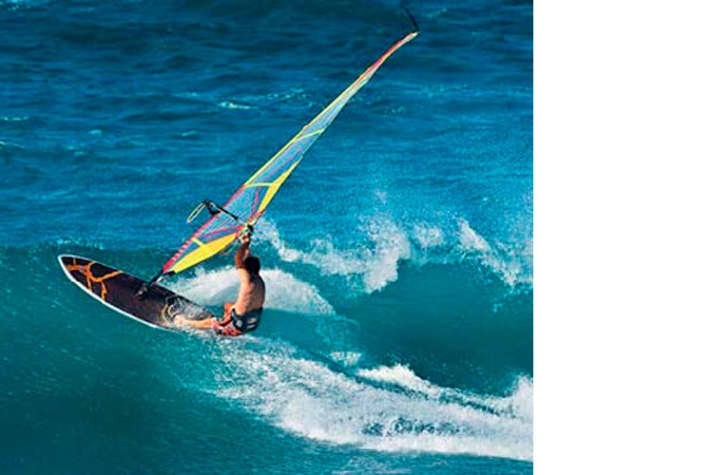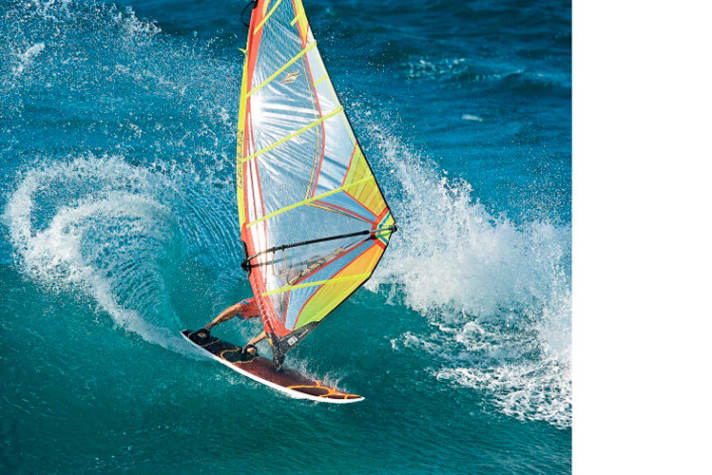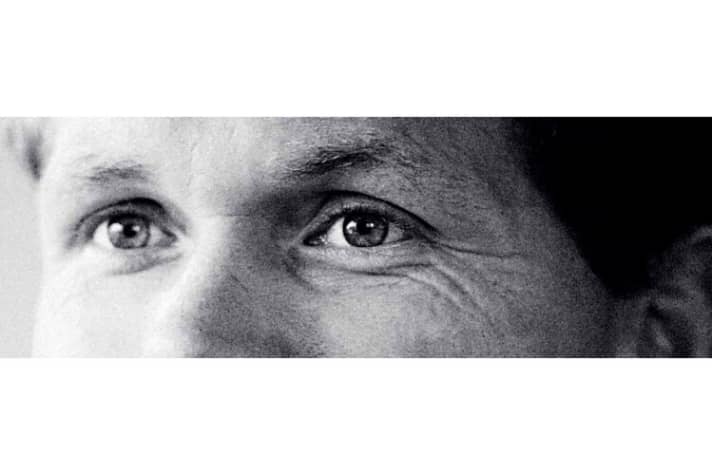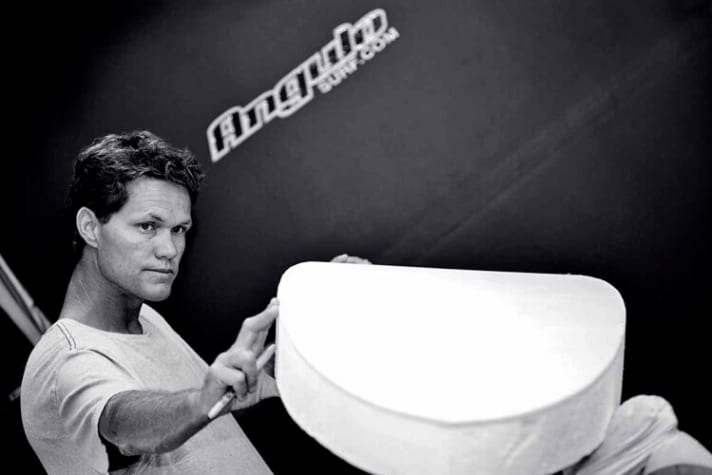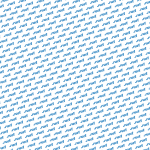Mark Angulo
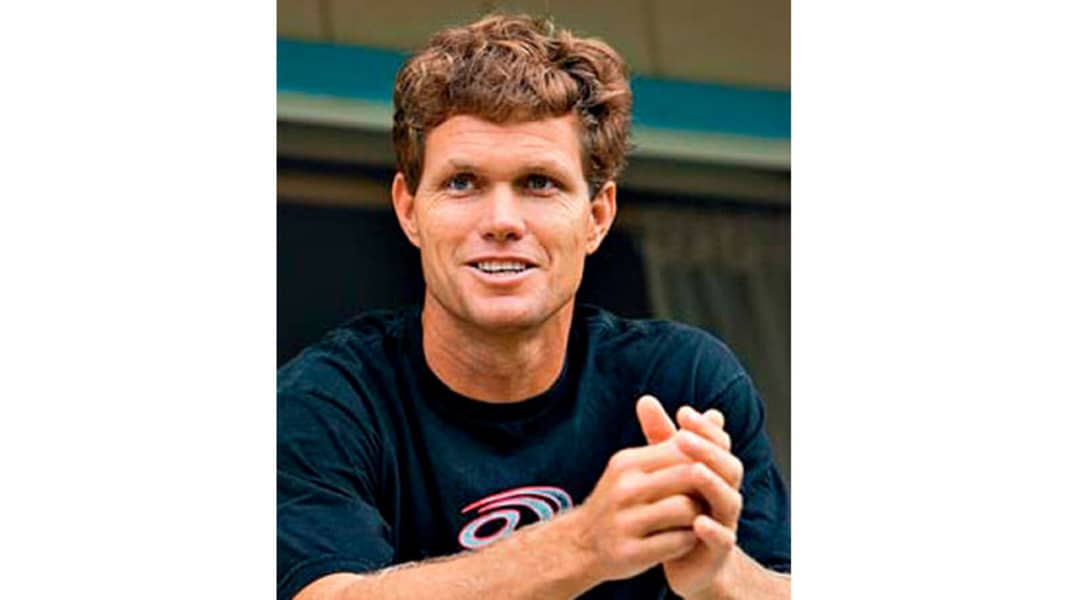
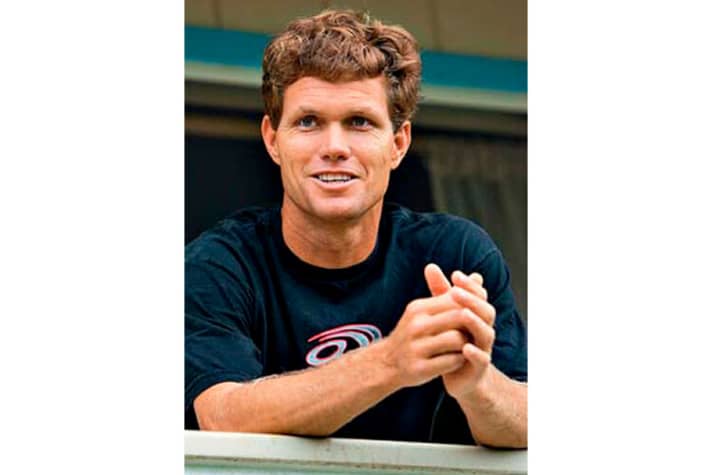
His innovation and natural talent led to modern wave surfing. He is the inventor of the wave 360, goiter and father of the twisted aerial in the 80s. And he was the first windsurfer in Jaws. His moves still inspire the best windsurfing athletes today. Mark Angulo was the epitome of the still-twisted, still-radical. This brought him some prestigious competition victories (e.g. Aloha Classic) during the golden Hawaiian era, but he was also twisted and radical in other ways: like his brother Josh, he was drawn deep into the maelstrom of drug use. He became an alcoholic. This cost him his promising career. John Carter had a frank conversation with Mark about the demons the model athlete had to fight and his path back to the normality he longed for and back on the water. Before Hookipa in autumn 2006, he celebrated his comeback with his crazy radicalism. At 38, can he follow in the footsteps of his younger, successful brother Josh? REVIEW Mark Angulo was born in California in 1968 and grew up on the notorious Northshore of Oahu in the 70s and 80s. His father, Ed Angulo, made a name for himself as a shaper in California. In 1969, he was drawn like a magnet to the Hawaiian surfing metropolis of Oahu. The most radical waves and surfer types on the Northshore influenced the development of the Angulo kids and fuelled the gifted talent of both boys. Mark: "We were a surfing family. My mum took us to the shorebreak when we were little, while my dad shaped for the most prestigious brands. My best friends were all famous surfers like Ricky Irons. Or I hung out with Mark Thomas from Rip Curl or the singer Jack Johnson." THE HARD SCHOOL Mark: "We were just kids and weren't aware of our tough environment until later. If you grow up on the Northshore, you automatically become competent in the waves without realising it. We played every day on the most dangerous beaches and waves in the world. We had fun without realising the dangers of the ocean. Yes, it was really hardcore! Anyone who knows Monster Mush, Backyards and Cobola Bay knows what I mean." In 1986, following the windsurfing industry, the Angulo family moved to Maui. The Angulo kids were already outstanding windsurfers in the waves. Mark's talent and Ed's shaping expertise catapulted the Angulo custom board brand to one of the market leaders. Mark: "I was able to earn a very good pocket money back then by winning on Maui or finishing in the top five. Then I went to the Gorge in 1986. That's when I met Barry Spanier (ed.: now Naish Sails) and Jeff Bourne from Neil Pryde and they wanted me to ride for them and offered me a lot of money. I thought: Wow, sure! I came home, won contests and travelled around the world from '86 to '90. A lot of good things happened, but also a lot of bad things. I was on a high, made a lot of money. My friends in Hawaii had to wait tables in restaurants and smoked hash and I was earning up to 100,000 dollars a year in my younger years. Maybe it wasn't the best thing for me, but today I'd be happy with that money." (laughs)THE INNOVATOR
Mark was called the King of Aerobics. He earned his name in the surfing elite by taking the sport to another level. He was innovative, fascinating to watch and unpredictable for his competitors in the waves. His raw talent and courage is still highly recognised today. Greats such as Levi Siver, Alex Mussolini and Boujamaa Guilloul have been inspired by him. Mark: "I don't want to brag, but when I came from Oahu, most windsurfers were good at riding waves, but not really good. I was exposed to the best and most radical waves since I was born, similar to Robby Naish. Windsurfing in waves came naturally to me. But the wave 360 was the result of a mistake. It blew me out of the wave and I involuntarily rotated. A friend from Backyards, Craig Yester, used to call me Baby Gu. Hence the name Gu Screw. My dad didn't like the word screw, so we called it Aerial 360 and they all laughed at me when I practised new moves. Suddenly I could do them and then all the other riders had to follow suit. I always wanted to be one step ahead. That sounds funny to anyone who knew me as rather laid-back back then." THE DREAMER
Mark: "Sometimes things happen that are simply funny. Even today. I dream about things that then become reality. For example, I used to dream about moves. Then I tried them the next day and they almost always worked. The Goiter was one of those dreams. I dreamt the Goiter, man! (laughs) I woke up and thought: Man, that was weird. Sometimes I was blown into a twisted position in the air and the move was created. These twists in aerials or loops already existed in surfing. On Oahu, the surfers called me Noodle Boy because I was so twisted. I'm not actually that agile, but on the water.....maybe because my head is so big and heavy." (laughs) When Josh Angulo was twelve years old, he followed in the footsteps of his older brother Mark. Thanks to his brother, his talent and his similarly uncompromising way of surfing waves, he was the shooting star of the World Cup scene. Mark: "Josh was a rat. He was just a kid and exposed to a lot of hardcore things too early. When he was very little, he often had to sit in the car and watch us surf. Without food, without water. Of course he wanted to get into the water. Either stew in the car or go surfing with the big boys. He went into even bigger waves earlier than me. He became better than all the other surfers and tougher. He jumped some of the twisted things I did. Maybe it does run in the family. My mum is Mexican. It's definitely a Mexican thing. (laughs)THE TOUR DE MARK With his surfing career on a mega upswing, Mark saw himself as one of the key roles in the Neil Pryde team's marketing campaigns. He was the brand's flagship athlete and travelled to all the major events. Mark: "I wasn't at every World Cup. To this day, I'm a total loser in waves with wind from the left. It's like pulling teeth for me: I can't even do a decent bottom turn on a backboard bow." LOSS OF CONTROL On the one hand, the "to do or die" attitude helped Angulos to fame on the water, but this behaviour had a negative effect on land. As stars, the door was wide open for the "twisted" Maui boys. Parties, alcohol, drugs and an extreme demeanour made both of them the "bad boys" of the windsurfing scene. Mark: "I was really slipping off the edge of my board at the time. I would come to events, get drunk and become a problem case. It wasn't always that bad, I have fond memories too. Then at the World Cup in England I got into an argument with the tour manager at the time, Terry Wyner, and was expelled from the PBA for slapping him. Then things went from bad to worse: I met Mr Neil Pryde himself at the ISPO in Munich. He grabbed me and pulled me into a quiet room. It wasn't a direct dismissal, but he let me know that he could no longer tolerate my behaviour. When I got home, the payments stopped abruptly." THE WILD MARK Mark: "I don't know where the wild side in me comes from. We had a very strict Christian upbringing, first went to a public school, then to a public one. Both good and bad things happened to me on Oahu. I think with my fame, all the money, I lost control. Everything got out of control with the alcohol. That was in the early 90s. After Mark lost his main sponsor Neil Pryde, everything went down the drain. Who knows what he would have brought to the windsurfing world if his priorities had been fixed on surfing? Mark: "When I look back and see how I've changed in the last two years, I only have one regret: what would I have been capable of in the waves while surfing? There is a ten-year gap in my life where I wasn't myself. Would I have changed the world of windsurfing? Maybe. I have no other regrets. We all go through phases in life for certain reasons. That's part of my experience. BAD BOYS IN A DOUBLE PACK Whilst Mark himself was kicked out of small companies like Simmer, his little brother Josh also attracted attention as a "bad boy" in the World Cup. The bad boy double pack threatened to explode. Mark: "Josh went through something similar to me. It didn't last as long as it did for me. It was only fleeting. I like to think I taught him more than bottom turns. For example, that he had to stop drinking earlier. He managed it. We both still make mistakes. It was a tough time. I spent a lot of time in rehabilitation centres. I was locked up in places away from the ocean and windsurfing. There I could think about what I had done. I didn't think so much about all the beautiful windsurfing spots, but about the fact that I wanted to be happy and see my family again. I wanted to go home and maybe have some fun in the sea. Today I have more than that: God has brought harmony to my family situation. I wouldn't say he saved my career, but I can windsurf again. And I am healthy. I had some serious car accidents and I know that it was God who gave me the chance to get out alive. That's how you learn what's really important in life." NIEMANDSLAND Mark: "A lot has happened in ten years: My wife Eleanor left me and divorced me. I've been vegetating in a shitty little hut. I didn't even drink beer any more. Just vodka. Vodka all day long. I stopped surfing and was always sick. Every now and then I showed a few kids how to tow surf. I can still remember it clearly: I had arranged to meet up with two kids (sons of a friend). I turned up for the appointment, but I felt blind because of the drugs and couldn't go out with the kids. I always thought I was only hurting myself. But when I saw the disappointment in the kids' eyes, I knew it wasn't like that. I felt like a real loser!"
LIGHT AT THE END OF THE TUNNEL Mark was determined to control his alcoholism and was admitted to a type of institution on Maui in 2004. He spent a year there, working hard and studying the Bible. Mark: "The place was called "My brothers keeper". (It was a Hawaiian family from Oahu. Two of the founding members were ice addicts from the hardest drug scene on Oahu. They developed a Christian-oriented programme on Maui. The time there was the hardest year of my life: waking up at five o'clock, Bible study, hard work, Bible study, going to bed. "TRUE LOVE Mark: "The first time I went on the water off Hookipa after the centre, I rode like a fool. I jumped this mega goiter and I was so shattered. But I dived out of the wave and laughed so hard and knew: I love windsurfing! Then I started working in my dad's shop and surfed every day or went surfing. I love windsurfing and I'm drawn to the water. I see a lot of young guys who are in a similar position to me back then and I want to set a good example now. I'm working on the shapes of the Angulo boards and yes, I'll have publications in the magazines, but I'm 38 and my sunshine days are over. I just want to get out on the water a lot. My goal is to be happy and live a regular life. I buy boards from the Angulo factory where I work and Robby and Michi Schweiger gave me a whole car full of Naish rigs. Robby is a good friend, but he didn't need to support me at all. I appreciate that." IN THE SHADOW OF THE LITTLE BROTHER While Mark spent his time in prisons and asylums, Josh managed to save his career despite alcoholism and became world champion in the wave in 2003. He also won the Aloha Classic in 2006 and the World Cup in Cape Verde this year. Today, Josh is a model athlete and the best ambassador for the Angulo board brand. THE CALM BEFORE THE STORM At 38, Mark reckons he has four good years left as a professional surfer. His role model is Robby Naish, who is four years older and rides almost as radically as in the old days. Mark: "It's crazy. Robby and I are the old hands. Even Jason Polakow is young to me. There are a lot of kids in Hookipa, me and Robby. Robby is a big inspiration for me. I'm sure he sees me as young too. When he stops, I can work out when it's time for me. (laughs) The young kids are amazing. For me, Levi Siver, although no longer a kid, is probably the best surfer in the wave. Sure, guys like Boujamaa and others impress me, but you can tell if someone can ride waves really well. The guys are good at hiding it, but in the end the wave riding technique shows between the jumps and tricks. Kai Lenny is one of the very young kids and grew up on the wave as a toddler. That makes a lot of difference. But it's fun to watch and be a part of it all. Today, a real comeback is even more difficult with all the good athletes. I'm just happy to have regained my life. I paid a high price for this realisation. I paid the price and now I'm free and clear-headed. I don't owe anyone anything. I don't look over my shoulder with regret. Everything is fine. Everything is quiet in the neighbourhood."
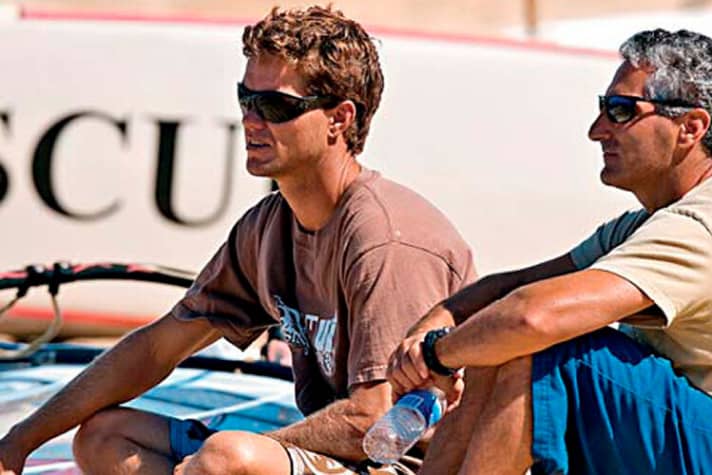
Mark with father Ed
